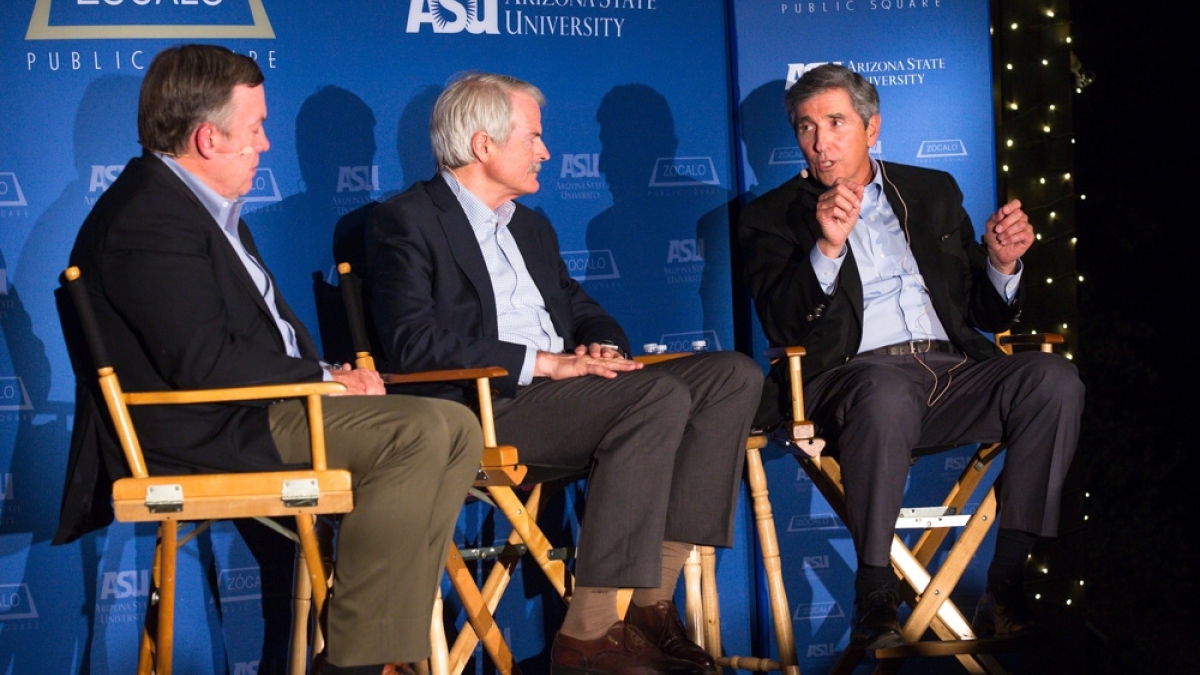Having medical coverage for all Americans is a noble cause and in recent years has been touted as a national priority.
But getting buy-in from the public and politicians is a challenge when there are still so many unknowns: how to share the costs, what kinds of coverage should be offered, and should oversight be federal, state, non-profit or private sector?
Two health-care experts explored the topic Wednesday night at a Zócalo Public SquareZócalo Public Square, an affiliate of Arizona State University, is a not-for-profit ideas exchange that blends live events and humanities journalism. event in Phoenix moderated by Arizona State University President Michael Crow.
“The health-care system that we have evolved into has been an evolutionary rational response to the incentives we’ve put in place,” said Dr. Denis A. Cortese, emeritus president and CEO of the Mayo Clinic, and Foundation Professor and director of the Healthcare Delivery and Policy ProgramThe program is part of the College of Health Solutions. at ASU.
“But we’ve ignored the fact that we should be paying attention to the way care is provided and outcomes over time. Redesigning the delivery system today is something that we are probably way behind in dealing with, and the problem is urgent.”
Cortese was joined by fellow panelist Sir Malcolm Grant, the founding chairman of National Health System England (NHS), which provides health care for approximately 60 million and employs close to 5 million people.
About 100 people gather at the Desert Botanical Garden for the Zócalo Public Square conversation April 6 in Phoenix. Top photo: (From left) ASU President Michael Crow moderates the conversation between Sir Malcolm Grant, the founding chairman of National Health System England, and ASU’s Denis A. Cortese. Photos by Charlie Leight/ASU Now
The pair spoke in front of a crowd of approximately 100 people at Desert Botanical Garden about America’s health-care system, the challenges it faces in the 21st century, and whether we should consider another model or partnering with other countries to create an international system.
“One of the things I like about Zócalo is that they are unafraid about taking on the biggest issues, the big topics and the really complicated things that other people run away from,” Crow said. “Both of these gentleman have been thinking about the issues that seem to get lost in the political rhetoric, in the day-to-day economic discussions that are going on today.
Crow added that of the 30 or so leading economies in the world, the United States spends more per capita on health by a factor of two than any other country and has a net health outcome in the bottom five.
“We have lower levels of life span and more problematic health outcomes,” Crow said. “Many countries are spending less than half of what we are and getting equal or greater outcomes than we are.”
Grant said Britain’s nationalized system was started in 1948 by the Labor Party, who believed the best way to provide security for their entire population was a system paid for through taxation and payroll deduction. He said that although it did and still does have the best of intentions and has had fairly good health outcomes, that system is no longer working.
“It’s a model that’s totally taxable but really creaking under the pressure of what we can afford to provide,” Grant said. “We are a single payer that provides for hospitals directed by the government. But it’s a fragmented system that’s not very coherent … we’re entering a stage of hysteria, and we know we’ve got to make a change.”
The hysteria was felt on Tuesday when the NHS suffered its third junior doctor’s strike of the year — doctors with 10 years or less of service — disrupting operations, treatment and service to thousands of patients. On April 26-27, junior doctors plan to strike again, refusing to staff their departments as well as emergency surgery and intensive care.
Malcolm Grant (center) shares about the negative realities of Britain’s nationalized health system with (left) ASU President Michael Crow and Denis A. Cortese.
Cortese said before anything drastic like that happens on our side of the pond, he thinks the States should consider adopting a government-sponsored insurance program like that in the Netherlands, Germany and Switzerland, which offers insurance to all but is administered through private insurance companies.
“You hear about fraud in Medicare all the time, but when’s the last time you heard about any fraud in private insurance?” Cortese said. “They’re efficient, they’ll weed out the fraud and waste and can still make money.”
Cortese said he’s not talking about socializing health-care delivery but about a carefully crafted five-point system that includes national coverage to everyone, has the option for a higher level of care, is market-based and offers means-tested support from the government.
Many already contend that the Affordable Care Act of 2010 mandates that all Americans possess health insurance and requires private insurance companies to offer certain kinds of coverage, Cortese said. But the act has failed in many regards, chiefly in insuring all Americans.
“Even if the Affordable Care Act works perfectly by 2025, we’ll still have 31 million people uninsured,” Cortese said. “Our federal government should have a national strategy and make a commitment to getting everybody insured.”
But there’s good news. Although the current system is broken, says Cortese, it can be fixed.
“We already have a system in place that like in the Federal Employees Health Benefits Program,” Cortese said. “It’s a very efficient system and is run well. It’s a great model.
“The problem is our leaders do not understand the difference between governance and managing. Governing means oversight, making sure goals and expectations are met and holding people accountable. We can get this done, so let’s do it.”
More Health and medicine

Bird flu: Your questions on symptoms, spread and safety answered
Bird flu is no longer only “for the birds.”Infections have expanded beyond wild birds and poultry to a range of animals — from mice to mountain lions, dairy cows to domestic cats, and polar bears to…

Making medicine side-effect free
Many drugs that address medical conditions can come with serious side effects. In drug commercials, the litany of potential side effects is often longer than the benefits being touted. Carl…

Diagnostic research happening at ASU focused on detecting diseases earlier to save lives
It was one of America’s founding fathers, Benjamin Franklin, who may have foreshadowed today’s health care innovation when he quipped the adage: An ounce of prevention is worth a pound of cure.In…




